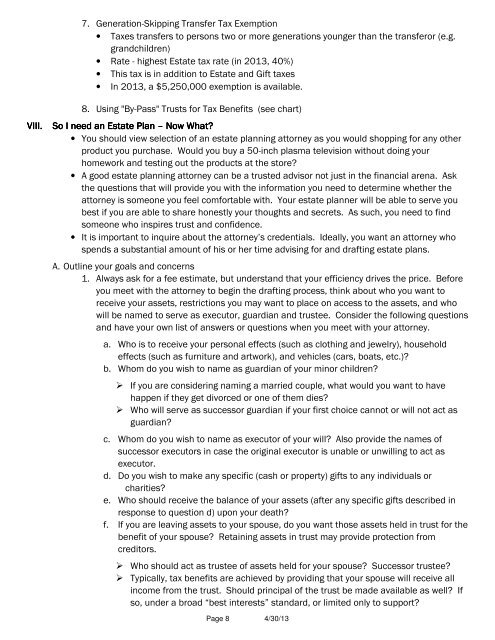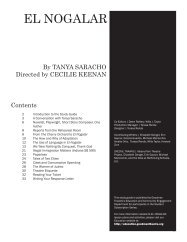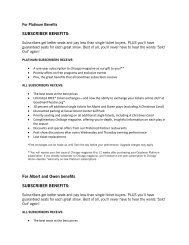Estate Planning Seminar Materials - Goodman Theatre
Estate Planning Seminar Materials - Goodman Theatre
Estate Planning Seminar Materials - Goodman Theatre
You also want an ePaper? Increase the reach of your titles
YUMPU automatically turns print PDFs into web optimized ePapers that Google loves.
7. Generation-Skipping Transfer Tax Exemption<br />
• Taxes transfers to persons two or more generations younger than the transferor (e.g.<br />
grandchildren)<br />
• Rate - highest <strong>Estate</strong> tax rate (in 2013, 40%)<br />
• This tax is in addition to <strong>Estate</strong> and Gift taxes<br />
• In 2013, a $5,250,000 exemption is available.<br />
8. Using "By-Pass" Trusts for Tax Benefits (see chart)<br />
VIII. So I need an <strong>Estate</strong> Plan – Now What?<br />
• You should view selection of an estate planning attorney as you would shopping for any other<br />
product you purchase. Would you buy a 50-inch plasma television without doing your<br />
homework and testing out the products at the store?<br />
• A good estate planning attorney can be a trusted advisor not just in the financial arena. Ask<br />
the questions that will provide you with the information you need to determine whether the<br />
attorney is someone you feel comfortable with. Your estate planner will be able to serve you<br />
best if you are able to share honestly your thoughts and secrets. As such, you need to find<br />
someone who inspires trust and confidence.<br />
• It is important to inquire about the attorney’s credentials. Ideally, you want an attorney who<br />
spends a substantial amount of his or her time advising for and drafting estate plans.<br />
A. Outline your goals and concerns<br />
1. Always ask for a fee estimate, but understand that your efficiency drives the price. Before<br />
you meet with the attorney to begin the drafting process, think about who you want to<br />
receive your assets, restrictions you may want to place on access to the assets, and who<br />
will be named to serve as executor, guardian and trustee. Consider the following questions<br />
and have your own list of answers or questions when you meet with your attorney.<br />
a. Who is to receive your personal effects (such as clothing and jewelry), household<br />
effects (such as furniture and artwork), and vehicles (cars, boats, etc.)?<br />
b. Whom do you wish to name as guardian of your minor children?<br />
If you are considering naming a married couple, what would you want to have<br />
happen if they get divorced or one of them dies?<br />
Who will serve as successor guardian if your first choice cannot or will not act as<br />
guardian?<br />
c. Whom do you wish to name as executor of your will? Also provide the names of<br />
successor executors in case the original executor is unable or unwilling to act as<br />
executor.<br />
d. Do you wish to make any specific (cash or property) gifts to any individuals or<br />
charities?<br />
e. Who should receive the balance of your assets (after any specific gifts described in<br />
response to question d) upon your death?<br />
f. If you are leaving assets to your spouse, do you want those assets held in trust for the<br />
benefit of your spouse? Retaining assets in trust may provide protection from<br />
creditors.<br />
Who should act as trustee of assets held for your spouse? Successor trustee?<br />
Typically, tax benefits are achieved by providing that your spouse will receive all<br />
income from the trust. Should principal of the trust be made available as well? If<br />
so, under a broad “best interests” standard, or limited only to support?<br />
Page 8 4/30/13
















